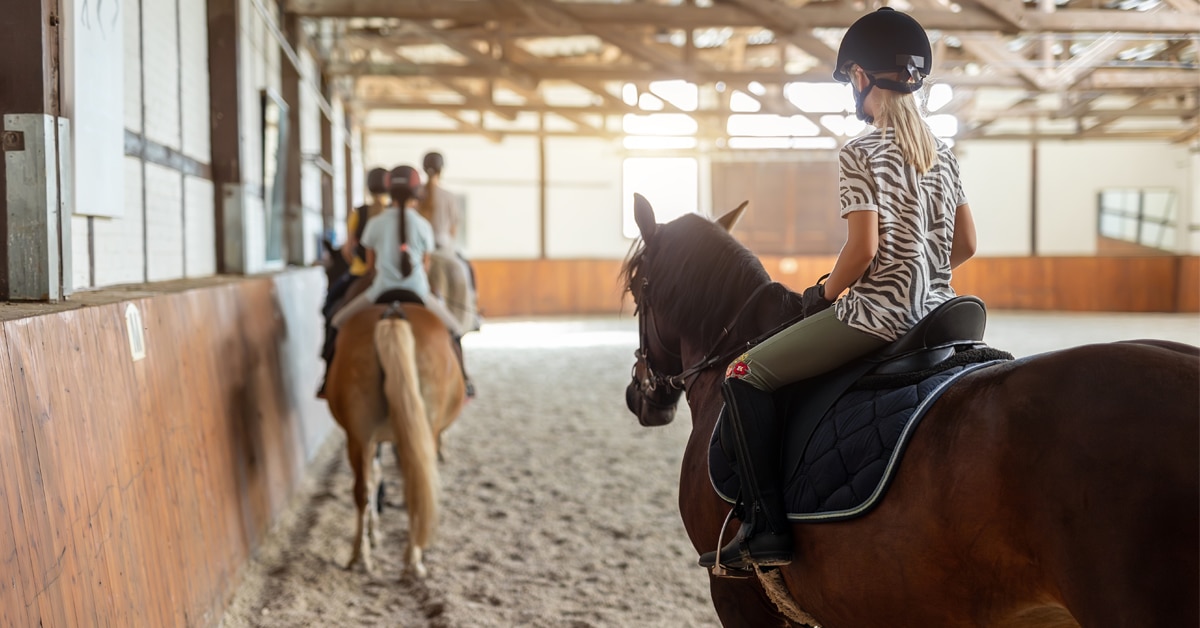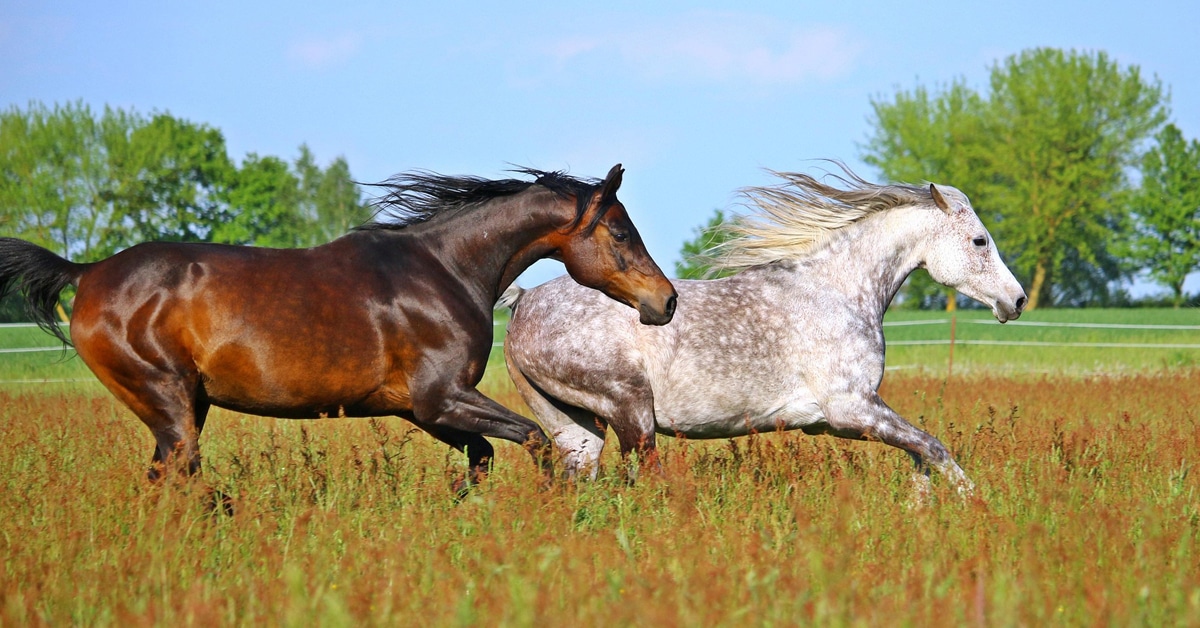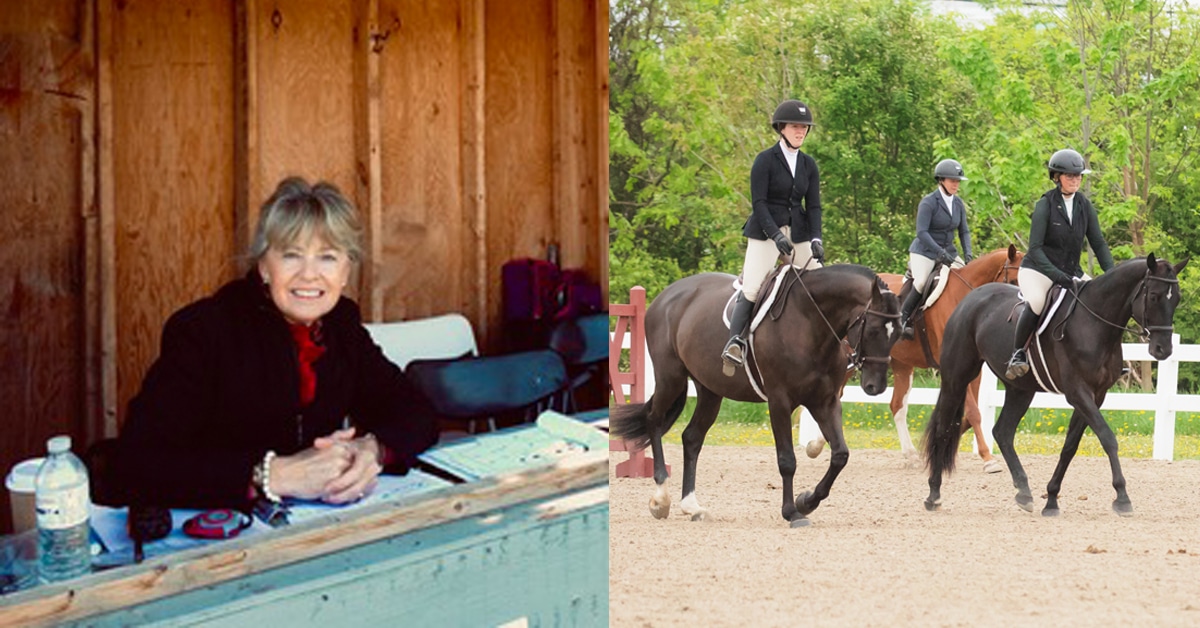Would you know if your horse was depressed? Horses can’t talk to psychologists – or their owners – about how they’re feeling, but they can give us important information based on how they behave. Researchers are now trying to clarify what those behaviours mean. Dr. Carole Fureix, working with Dr. Georgia Mason from the Ontario Veterinary College, has been investigating the clues that might point to what she describes as “a depression-like condition” in horses.
It started by chance, she says. Fureix was studying other aspects of equine welfare when she noticed that some horses tended to spend time in an unusual posture. “They had times when they were totally motionless, with unblinking open eyes and a fixed gaze, with a flat-necked posture and backwards-pointing ears,” Fureix notes. This was not the same as the relaxed posture of a horse that is sleeping or resting.
As she observed these horses further, she noted that they also had reduced responsiveness to tactile stimulation and less reaction to the sudden appearance of a human at the stall door, in comparison to other horses at the same stable. “They appeared to be withdrawing, which resembled the reduced engagement with the environment observed in clinically-depressed humans,” Fureix explains.
Sweet pleasures
Mason suggests that in humans, this withdrawal can be the result of “learned helplessness.” She says: “People who are depressed stop responding, because they have learned that responding doesn’t make any difference. We think that horses may feel that way, too. The reality is that many horses don’t have much control over their lives.”
Fureix wanted to investigate this further, to see if the withdrawn posture could be connected to any other symptoms known to be part of the depression diagnosis. It’s know that “anhedonia” – no longer feeling pleasure from experiences that used to be pleasurable – is a core symptom of depression in humans. She decided to see if this could be measured in horses.
Her study focused on sugar. “Sweet tastes are pleasurable in humans, and sucrose ingestion is likely to be pleasure-driven in some other species, given that rodents, for example, will eat sugar even when they do not need to eat because they are full,” she says. Like rodents, horses will choose water with sugar added to it over plain water, and will choose sweetened foods over unsweetened, so it suggests that they may be finding pleasure in that taste.
For her research, Fureix and her co-researchers selected 20 horses from a riding stable where each animal was used in lessons for four to 12 hours per week. The horses were observed over 15 days to see if they displayed the “withdrawn” postures described above. Eleven of them were moderately or fully withdrawn at times, while nine were not. This was not related to age or sex, but was strongly related to time spent on stereotypic behaviours such as cribbing, weaving, lip or teeth rubbing, nodding, and head-shaking.
To determine whether they liked sugar, all the horses were offered sugar lumps once a day by hand for six days. All of the horses ate the sugar. For the study, each horse was offered a flavoured sugar block; once he or she licked it, the researcher attached the block to the wall of the horse’s stall. (The test was repeated with different flavours, in random order.)
Each block of sugar was then weighed at intervals over the next couple of days. She found that the horses who were withdrawn ate less sugar, and those who spent the most time in the withdrawn posture ate the least sugar. “Assuming that sugar consumption is driven by pleasure,” says Fureix, “then horses who are at times withdrawn are more anhedonic than those who are not. This is a key symptom of clinical depression and suggests that withdrawn horses are indeed in a depression-like state.”
Physical signs and possible causes
Mason explains that in addition to the withdrawn stance, a sensitive horse owner will be aware of other signs that the horse is not experiencing pleasure. If your horse used to run around the pasture when first let out, ears pricked, or used to respond with enthusiasm to having his neck scratched, and now never shows these behaviours, you might suspect he’s feeling less pleasure in his life.
Fureix adds that for many of the horses they observed, the withdrawn behaviours had persisted over many years. “However, all these findings do not demonstrate with certainty that horses in human care can become clinically depressed,” she points out. Additional research is needed to determine how and when depression might be diagnosed in equines and other animals. On the other hand, she says, “these are certainly not happy horses. This is not a good condition to be in.”
Is this depression-like state common? “It’s really too early to tell,” says Fureix. “Anecdotally, my colleagues and I have seen withdrawn postures in some of the horses at many riding schools.”
While she doesn’t have research to show what might cause this condition, Fureix suspects that the horse’s working conditions are likely to play a crucial role. Being ridden can cause chronic back pain, for example, and negative experiences in training might induce the state of learned helplessness.
Mason adds that the horse’s social environment may be a factor as well. “Horses are naturally herd animals who make strong connections with their herd-mates. But often we keep them isolated in stalls, which is very hard on them. Or we buy and sell them like cars, so that they are constantly losing the connections they’ve made with other horses. Eventually the horse may come to feel that there is no point in integrating into his new herd, because he’ll be moved soon anyway.”
The road back to happiness
If you see some of the signs of depression in your horse, what can you do? The first step, both Fureix and Mason agree, is to have your vet check the animal for any possible sources of chronic pain and have that treated appropriately.
Once you are confident that your horse is physically comfortable, look for ways to improve the horse’s environment. Maximizing the time spent in a pasture with a group of other horses can make a big difference, as social isolation and confinement are very stressful for horses. “If you don’t have fields available,” says Fureix, “giving the horses as much free time as possible in the arena, as a group, with some hay to eat, can help.” It can also help to give the horse choices when you can – allowing him to choose to be indoors or out, for example.
When riding or training your horse, use positive reinforcement rather than negative. That means providing rewards when the horse does something you want him to do, rather than punishments when he doesn’t perform as requested.
As one example of how this can help, a 2010 study by Carol Sankey taught one group of ponies to back up by rewarding them with pellets when they took a step back. A second group being trained to back up had a whip shaken in front of their faces when they did not take a step back. Not surprisingly, the group trained with the whip had higher heartrates and increased tension, took longer to learn the behaviour, and were more likely to avoid people at other times.
Look for ways to have positive interactions with your horse; grooming, for example, can be pleasant and relaxing if you pay attention to the horse’s reactions.
“This research is really in its infancy,” says Mason. “We can’t yet answer the question of whether horses become clinically depressed. But there is certainly enough information to guide horse owners who want to improve their horse’s lives if they see these behaviours and signs.”
The Latest










